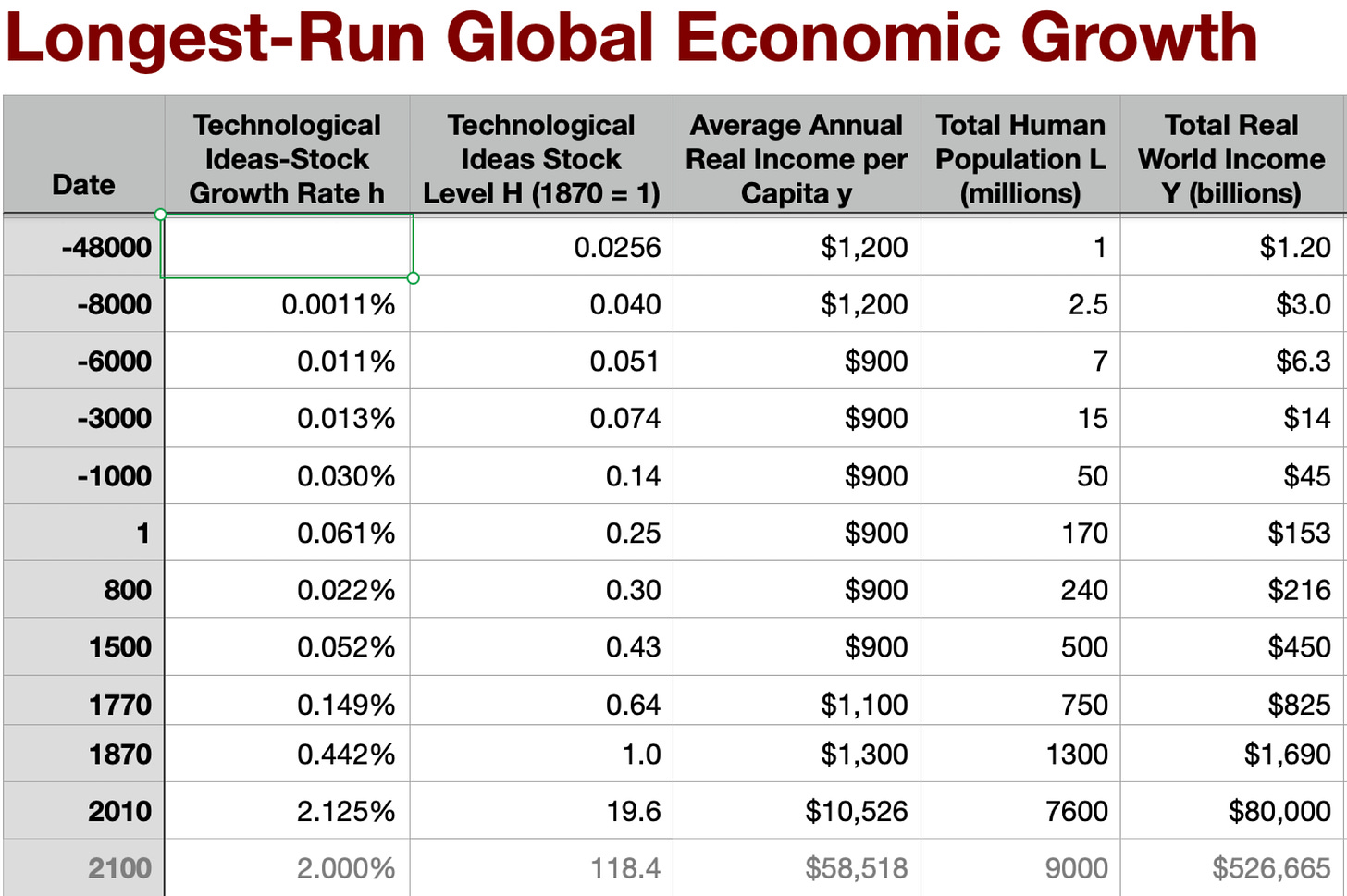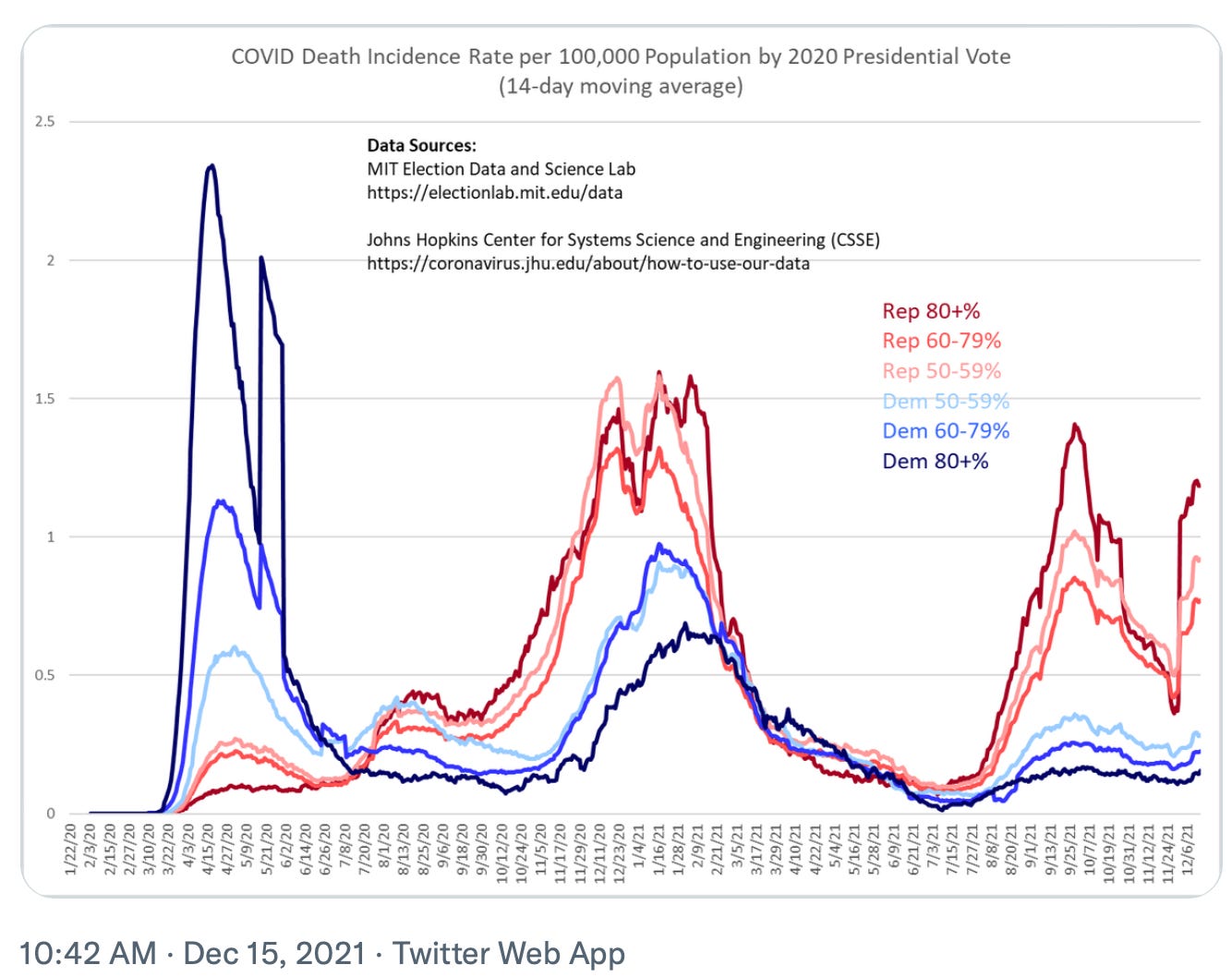Plotting Out þe First Lecture for Spring 2022: History of Economic Growth
& BRIEFLY NOTED: For 2021-12-16 Th
First:
IN JANUARY I am, once again, appropriating the intellectual property of the brilliant Melissa Dell <https://dell-research-harvard.github.io>, and trying to teach my own version of her course Economics 1342: The History of Economic Growth <https://dell-research-harvard.github.io/teaching/econ1342>.
Here is what I am thinking of doing for the first lecture:
Take the square-root of what we think is the total world population and multiply it by our very crude measures of average real income per capita, and call that “technology”—the value H of the stock of useful ideas about manipulating nature and organizing humans discovered, invented, developed, and deployed globally into the world economy. Normalize H by setting its value in 1870 equal to 1.
Why take the square-root? Well, if we just multiplied average income by population—called total world real income “technology”—we would be implicitly assuming that labor is useless and unproductive. But that cannot be right: each mouth comes with two eyes, two hands, and a brain. If we just took average income—called that “technology”—we would be implicitly assuming that natural resources are unimportant, and that it does not matter how small population growth has reduced the size of the average plot of land on which a typical person’s food is to be grown. That also cannot be right: resource scarcity, and attempts to compensate for it, are a very real thing in our world, today and in our past.
The square-root is a compromise. Is it the right compromise? We can argue about that. What would you suggest?
There is also—I must admit—worries about the average income estimates. Styles of life and the relative prices of commodities are so different between the upper-middle class of the global north today and Neolithic near-subsistence farmers and Paleolithic gatherer-hunters that a one-dimensional “real income” measure may not have much income. Plus there is the fact that our income measures add things up based on what they cost, but the measure we want is what we spend our income on is worth to us. The difference is what economists call “consumer surplus”. (I think I have a memory of economist Robert Barro saying or writing somewhere that for a rival-material good consumer surplus was probably, on average, about equal to factor cost; but that for a non-rival attention-information good the ratio was likely to be much larger: perhaps five or ten to one. That struck me as very smart, and likely to be true. But I have been unable to find this anywhere.)
Nathan Mayer Rothschild, the richest man in the first half of the 1800s, died in his fifties of an infected abscess in his butt—something we would cure with a lancing and a single dose of amoxicillin, followed by being yelled at by a medtech for having let it get so bad before asking for help. Does that mean that every single one of us with access to modern antibiotics is, properly assessed, richer than Nathan Mayer Rothschild was? In a profound sense, yes.
I once got ten pounds of potatoes at Trader Joe’s for a dollar. That’s 0.005 cents per calorie. At the California minimum wage, that is about 1 second of work for 100 calories. For a Neolithic near-subsistence farmer, about half your work-time has to be devoted just to getting calories, and your productivity is maybe 10000 calories for half-a-day’s work: 2500 calories/hour, or 2 minutes for 100 calories. Are we thus not the 12 times that the table above presents but rather 100 times richer on average than our predecessors? Perhaps. But there are also things we value that take just as much of our labor-time to obtain today as 5000 years ago, the respect of our peers high among them. And there are things we value today that our predecessors could not obtain at any price—like amoxicillin. What is the proper average summary statistic of all of these multi-dimensions of economic growth? Is there a proper average summary statistic?
Return to the table with which I began:
Focus, for now, on the first two columns—the proportional rate-of-growth, in percent per year, h of this value-of-technology stock, and its level H.
What jumps out at you from this table? For me, twelve things stand out:
The Neolithic Revolution from -8000 to -6000: the invention of agriculture (and herding).
The glacial pace of technological progress in the past—that over 1870 to 2010 we saw, in an average year, 200 times the proportional technological progress of the early Agrarian Age. (And, of course, growth from a much, much higher pace.)
Nevertheless, the large cumulative magnitude of technological progress in the past: as much from -6000 to 1870 as from 1870-2010.
The acceleration of growth in the early Agrarian Age -6000 to the year 1: literacy matters for making humanity an anthology intelligence composed not just of those alive today but also of the dead, and two heads are better than one for solving problems.
The Late-Antiquity Pause from 1 (actually 150) to 800—I at least would have expected another doubling of the rate of progress after the year 1, which would have carried H up to 0.65 by 800 and then possibly put the world at the cusp of the Industrial Revolution, but we did not attain that level of H until 1770.
The Mediæval Recovery of technological progress to something like its pre-pause norm (but with the year 800 seeing five times the human population of the year -1000, why wasn’t there faster growth in H than in the -1st millennium?).
The Imperial-Commercial Age step-up in growth over 1500 to 1770.
The British Industrial Revolution Age from 1770 to 1870.
Modern Economic Growth from 1870 to 2010.
The Population Explosion and Demographic Transition from 1770 to 2100.
Whatever is going on now—if global warming and other problems do not interrupt Modern Economic Growth, what do we have to look forward to for the world of 2100?
Is this a misguided intellectual enterprise—focusing on H, and taking it to be something real and important rather than a distracting mental-fictional cloud-castle that does more to confuse than to enlighten us?
I figure I can get through this in fifteen minutes at the start, and then see what kind of class the 75 students I will get are—will we then be able to discuss the twelve interesting features of the table (and whatever else they come up with), and for how long, or will I have to start lecturing again?
One Video:
Phil Libin: The Out-of-Office World <https://www.youtube.com/watch?v=mBKIMhGO8WA>:
One Picture:
Very Briefly Noted:
Ben Thompson: The Great Bifurcation <https://stratechery.com/2021/the-great-bifurcation/>
Terry Crowley: Yuck, Office HTML: ‘Who wouldn’t want to read about the challenges of how to encode an empty paragraph in HTML?… <https://terrycrowley.medium.com/yuck-office-html-7a249c24e57f>
Elizabeth Heritage: Turns Out the Much-Maligned“ Mysteries of Udolpho” Is Good, Actually!<https://www.tor.com/2021/12/14/turns-out-the-much-maligned-mysteries-of-udolpho-is-good-actually/>
Brad DeLong: As Cosma Shalizi Says, “The Singularity Is in Our Past” <https://delong.typepad.com/sdj/2013/03/as-cosma-shalizi-says-the-singularity-is-in-our-past-saturday-twentieth-century-economic-history-weblogging.html>
Paragraphs:
Bryce Baschuk: ’The leading economies of the Asia-Pacific region are steadily moving forward with trade liberalization initiatives that may ultimately leave the U.S. out in the cold…. Japan is apparently holding out for a better deal on steel and aluminum…. This isn’t particularly surprising, though. Ever since Trump’s metal fight began in 2018, Japan has taken a higher road than other nations when it came to sparring with the U.S…. Japan filed a complaint under the WTO’s lengthy dispute settlement process and engaged in bilateral talks…. Japan has consistently urged the U.S. to rejoin the 11-member Comprehensive and Progressive Agreement for Trans-Pacific Partnership…. This week, South Korea signaled its interest in joining the CPTPP…. And in two weeks the 15-nation Regional Comprehensive Economic Partnership will enter into force, creating a Chinese-backed partnership that encompasses 2.2 billion people with a combined GDP of about $26 trillion…
LINK: <https://twitter.com/bbaschuk>
Leszek Kolakowski: My Correct Views on Everything: Reply to E.P. Thompson: ‘Your letter contains some personal grievances and some arguments on general questions. I will start with a minor personal grievance…. You seem to feel offended by not having been invited to the Reading conference and you state that if you had been invited you would have refused to attend…. I presume, consequently, that if you had been invited, you would have felt offended as well…. The moral ground you cite is the fact that in the organizing Committee you found the name of Robert Cecil… [who] once worked in the British diplomatic service…. Your integrity does not allow you to sit at the same table with someone who used to work in British diplomacy. O, blessed Innocence! You and I, we were both active in our respective Communist Parties in the 40s and 50s…. We supported, within our modest means, a regime based on mass slave labour and police terror of the worst kind…. Do you not think that there are many people who could refuse to sit at the same table with us?…
LINK: <https://socialistregister.com/index.php/srv/article/view/5323/2224>
Luke O’Neil: I Asked to Leave & They Told Me I’d Be Fired: ‘The U.S. is the most special nation in the history of the world…. I don’t really know what hell is but I don’t think it’s a place where bad things happen to people randomly such as natural disasters and death because that’s just what the regular world is. I think it’s probably more accurate to say it’s a place where bad things happen because someone wanted them to happen to you or just let them happen out of negligence and indifference. Where bad things happen and they didn’t have to but your life was less important to someone else than what they thought they had to gain…
LINK:
Roy Edroso: The Stupid Party: ‘I’ve talked here about how conservatives don’t really even seem to try to argue convincingly anymore, because the success of the Trump movement has taught them there’s no need for intellectual gymnastics or even, really, coherent thought—they just have to make bellicose MAGA noises and like-minded people will flock to the sound…
LINK:
Arthur Eckstein: READING: How Was It That Rome Conquered the Mediterranean & Created Its Pax Romana, Anyway?: ‘The ability—nay the eagerness—to turn conquered peoples into Romans was the key…. Rome after 340–338 replaced ethnicity and geographical location as the basis of membership in the polity with a ladder of legal status-groups not tied to either…. non-Roman allies (the socii), halfway citizens (the cives sine suffagio), full citizens (cives)…. the Romans were… generous in allowing non-Roman individuals and even (very occasionally) whole non-Roman polities to climb up this status hierarchy, Rome gained an enhanced capacity to win loyalty…. The capacity for inclusion and integration…. The rewards Rome was culturally and politically capable of dispensing… local peace… [and] the inclusion of local elites in the Roman state were much greater than any state in Greece could ever offer…. It was the system of inclusion, which was ultimately a diplomatic and political skill… that made Rome potentially the most powerful state in the ancient Mediterranean…
LINK:











> The square-root is a compromise. Is it the right compromise? We can argue about that. What would you suggest?
I think income is something of a trap concept. The Micawber principle -- Annual income twenty pounds, annual expenditure nineteen nineteen and six, result happiness. Annual income twenty pounds, annual expenditure twenty pounds nought and six, result misery -- applies.
So I think the useful measure is the amount and proportion of agency in the population.
You can have a high income, with high expenses and no resilience -- get sick, you're dead; miss a deadline, you're dead, etc. -- and have effectively no agency; you do what you must to survive. You are not as much better off than someone with less cash flow doing what they must to survive as the difference in the magnitude of the cash flow implies.
People want to be billionaires today because billionaires today have got effectively unbounded agency; if it can be done, they can do it. Most people today are aware that their agency is decreasing, and was and would have been even without covid.
The patterns of degree -- how far could someone in 13th century England go on a pilgrimage, and how often? -- and distribution -- persons of what degree could go on pilgrimages? -- are very likely tougher to pull out of history than income proxies, but I think that's where the interesting pattern lies.
I also think it's obvious that the post-1870 surge is spending from capital, not income, and has a high likelihood of reducing everyone's access to agency for the foreseeable future.
In the few existing hunter/gatherer groups it is often a 'women gather-men hunt' pattern. This suggests that if this pattern held in neolithic times, women invented agriculture.